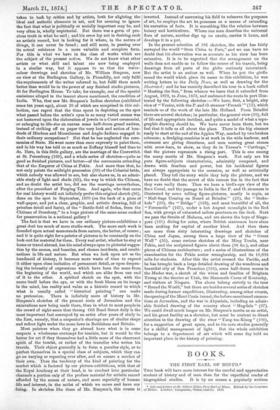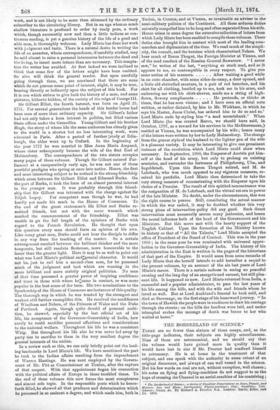BOOKS.
THE FIRST EARL OF MINTO.* Tars book will have more interest for the careful and appreciative student of history and of men than for the superficial reader of biographical studies. It is by no means a popularly written
* Life and Letters of Sir Gilbert Elliot, First Earl of dlinto. Edited by the Countess of Minto. London: Longman, Green, and Co. 1674.
shallow literature is produced to order by ready pens, a work which, though necessarily now and then a little tedious as con- tinuous reading, is yet a genuine history of the life of a good and able man, is thoroughly welcome. Lady ➢Tinto has done her work with judgment and taste. There is a natural desire in writing the life of an ancestor, whose correspondence, if carefully studied, may be said almost to raise a personal intercourse between the dead and the lhing, to insert more letters than are necessary. This tempta- tion the writer has avoided. At first indeed we were inclined to think that some few of the letters might have been omitted. So also will think the general reader. But upon carefully going through them, we are convinced that there are none which do not possess some point of interest, alight, it may be true, bearing directly or indirectly upon the subject of this book. For it is one which strives to give both the history of a man, and some pictures, hitherto hidden, of the society of the reign of George III. Sir Gilbert Elliot, the fourth baronet, was born on April 23, 1731. For several generations the heads of this border house had been men of more than ordinary capacity. Sir Gilbert's father had not only taken a keen interest in politics, but filled various State offices under the Grenvilles. Young Gilbert and his brother Hugh, the story of whose life the same authoress has already given to the world in a shorter but no leas interesting work, were educated in Paris. After a period of further [study at Edin- burgh, the elder went up to Oxford. In the beginning of the year 1777 he was married to Miss Anna Maria Amyand, whose sister subsequently became the wife of the first Earl of Malmesbury. The correspondence of the two sisters occupies many pages of these volumes. Though Sir Gilbert entered Par- liament at a comparatively early age, he was not one of those youthful prodigies who spring at once into notice. Hence, the first and most interesting subject to be noticed is the strong friendship which arose between Sir Gilbert Elliot and Edmund Burke. On the part of Burke, it took the form of an almost parental interest in the younger man. It was probably through this friend- ship that Sir Gilbert was intrusted with the charge against Sir Elijah Impey. For competent man though he was, he had hardly yet made his mark in the House of Commons. To the end of the great statesman's life Elliot and Burke re- mained friends, but not with the same warmth which marked the commencement of the friendship. Elliot was unable to go the full length of the opinions of Burke with regard to the French Revolution. He thought that upon this question every man should form an opinion of his own. Like many great men, Burke could not bear the disciple to differ in any way from the teaching of the master. So a certain estrangement resulted between the brilliant thinker and the more temperate, but still resolute Scotsman, more honourable to the lesser than the greater light. Here it may be as well to point out what was Lord Minto's political and:general character. It would not be_ just to call him a second-class man, for he possessed much of the judgment and tact which are wanting in the more brilliant and more strictly original politician. No man of that time possessed a greater power of inspiring confidence and trust in those with whom he:came in contact, or was more popular in the best sense of the term. His two nominations to the Speakership of the House of Commons are instances of this quality. The thorough way in which he was trusted by the strongest and weakest still further exemplifies this. He received the confidences of Windham and Nelson, of the Princess of Wales and the Duke
of Portland. Again, though quite devoid of personal ambi- tion, he showed, especially by the last official act of his life, his acceptance of the Governor-Generalship of India, how surely he could sacrifice personal affections and considerations to the national welfare. Throughout his life he was a consistent Whig. But throughout his life also he was never led away by party ties to sacrifice to them in the very smallest degree the general interests of the nation.
In a review such as this, we can only briefly point out the lead- ing landmarks in Lord Minto's life. We have mentioned the part he took in the Indian affairs resulting from the impeachment of Warren Hastings. He was next employed by the Govern- ment of Mr. Pitt as Commissioner at Toulon, after the capture of that seaport. With that appointment began his connection with the political affairs of Europe in those troubled times. To the end of these volumes this now forms the most conspicuous and almost sole topic. In the responsible posts which he hence- forth filled, he showed all that prudence and determination which he possessed in so eminent a degree, and which made him, both in
work, and is not likely to be more than skimmed by the ordinary Toulon, in Corsica, and at Vienna, so invaluable an adviser in the subscriber to the circulating library. But in an age when so much semi-military politics of the Continent. All these arduous duties naturally compelled him to be long and often separated from his wife. Hence arises in some degree the extensive collection of letters from which Lady Minto has been enabled to compile these volumes. These- duties also brought him in contact with most of the leading com- manders and diplomatists of the time. We read much of the simpli- city, the conceit, and the heroism which characterised Nelson. We hear much of Baron Thugut, the Foreign Minister at Vienna, and of the mad conduct of the Russian General Suwarrow. "I never saw," he writes of the last, " anything so stark mad, and as it appears to me, so contemptible in every respect. To give you some notion of his manners After waiting a good while in an ante-chamber, with some aides-de-camp, a door opened, and a little old shrivelled creature, in a pair of red breeches, and his shirt for all clothing, bustled up to me, took me in his arms, an& embracing me with his shirt-sleeves, made me a string of high- flown, flowery compliments He pretends, or thinks at times, that he has seen visions; and I have seen an official note- written, or rather dictated, by him to Mr. Wickham, in which he says his Master, Jesus Christ, has ordered him to do so and so.'
Lord Minto ends by styling him " a mad mountebank." When Lord Minto (he was created Baron, we should have said, in October, 1797, as a reward for his services in the Mediterranean,) resided at Vienna, he was accompanied by his wife ; hence many of the letters were written by her to Lady Malmesbury. The change from the graver style of the husband to the lighter pen of the wife is a pleasant variety. It may be interesting to give one prominent instance of the resolution. which Lord Minto could show when necessary. In September, 1800, the Emperor of Austria put him- self at the head of his army, but only to prolong an existing- armistice, and surrender the fortresses of Philipsbourg, Ulm, and Ingoldstadt. Upon this Baron Thugut retired, and M. de Lehrbach, who was much opposed to any vigorous measures, re- ceived his portfolio. Lord Minto then determined to take the very strong measure of remonstrating with the Emperor upon his choice of a Premier. The result of this spirited remonstrance was the resignation of M. de Lehrbach, and the virtual return to power of the late Minister. No doubt, under the circumstances, this was the right course to pursue. Still, considering the actual manner in which the war ended, it may be doubted whether this very strong piece of intervention-policy did any good. Such direct intervention must necessarily arouse many jealousies, and lessen the moral influence both of the head of the Government and his- Ministers. But this move met with the hearty support of the English Cabinet. Upon the formation of the Ministry known in history as that of " All the Talents," Lord Minto accepted the- office of President of the Board of Control. This was in the year• 1806 ; in the same year he was nominated with universal appro-
bation to the Governor-Generalship of India. The history of his- administration in the East is written in the pages of the historians•
of that part of the Empire. It would seem from some remarks of
Lady Minto that she herself intends to add hereafter a sequel to- the present volumes, by an account of the six last years of Lord,
Miuto's career. There is a certain sadness in seeing no peaceful evening end the long day of an energetic and earnest, but still plea- sant life. It happened so now. Lord Minto returned from India, a successful and a popular administrator, to pass the last years of his life among the hills, and with the wife and friends whom he- loved so well. But at Lord Auckland's funeral he took cold, and died at Stevenage, on the first stage of his homeward journey. " In the town of Hawick the people were in readiness to draw his carriage through the streets ; on the hills the bonfires were laid, and under. triumphal arches the message of death was borne to her who waited at home."







































 Previous page
Previous page